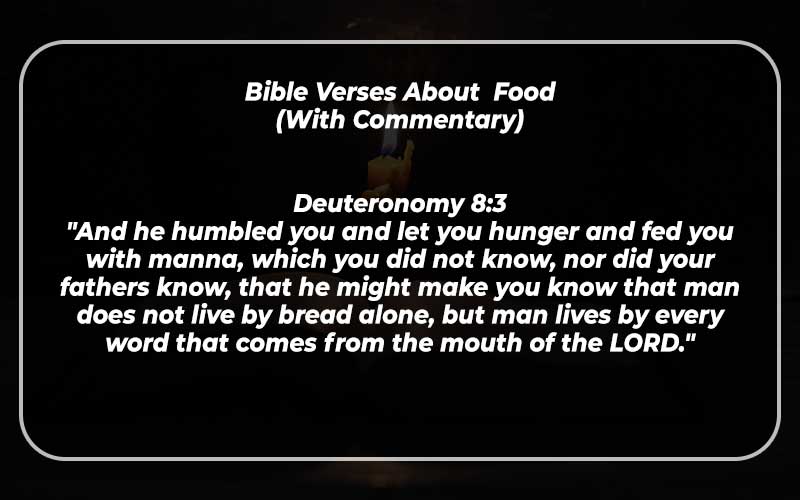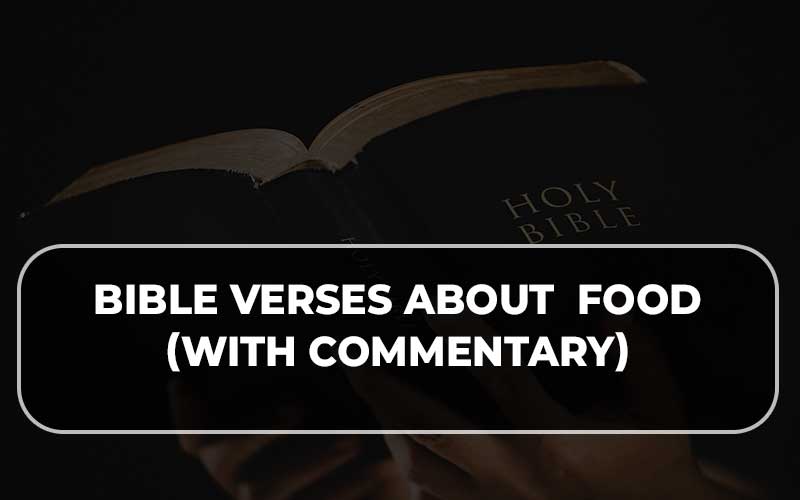Genesis 9:3
“Every moving thing that lives shall be food for you. And as I gave you the green plants, I give you everything.”
After the flood, God grants humanity permission to consume meat, recognizing a broader provision for sustenance.
Proverbs 13:25
“The righteous has enough to satisfy his appetite, but the belly of the wicked suffers want.”
Righteous living is associated with contentment and having enough, contrasting with the lack experienced by the wicked.
1 Corinthians 10:31
“So, whether you eat or drink, or whatever you do, do all to the glory of God.”
This verse emphasizes the idea that even mundane activities like eating can be done with a focus on honoring God.
Genesis 1:29
“And God said, ‘Behold, I have given you every plant yielding seed that is on the face of all the earth, and every tree with seed in its fruit. You shall have them for food.'”
God’s initial dietary provision for humanity consists of plant-based foods, reflecting a harmonious relationship with creation.
1 Timothy 4:4-5
“For everything created by God is good, and nothing is to be rejected if it is received with thanksgiving, for it is made holy by the word of God and prayer.”
This passage encourages gratitude for the variety of foods created by God, emphasizing the sanctifying nature of thanksgiving.
Proverbs 25:27
“It is not good to eat much honey, nor is it glorious to seek one’s own glory.”
Moderation in consumption is advised, and the verse extends beyond food to a broader principle of balanced living.
Ecclesiastes 3:13
“Also that everyone should eat and drink and take pleasure in all his toil—this is God’s gift to man.”
Enjoying the fruits of one’s labor, including food, is seen as a gift from God, highlighting the importance of savoring life’s moments.
Proverbs 27:27
“And you shall have enough goat’s milk for your food, for the food of your household and maintenance for your girls.”
The provision of goat’s milk is acknowledged as a valuable and sustaining element of daily sustenance.
Luke 24:30
“When he was at table with them, he took the bread and blessed and broke it and gave it to them.”
The act of Jesus breaking bread is not only a physical act but also a symbolic one, foreshadowing the Last Supper and emphasizing the communal aspect of meals.
Proverbs 15:17
“Better is a dinner of herbs where love is than a fattened ox and hatred with it.”
The quality of relationships during a simple meal is deemed more valuable than a feast marred by animosity.
Matthew 6:11
“Give us this day our daily bread.”
In the Lord’s Prayer, the request for daily bread symbolizes dependence on God for sustenance in every aspect of life.
Proverbs 30:8-9
“Remove far from me falsehood and lying; give me neither poverty nor riches; feed me with the food that is needful for me, lest I be full and deny you and say, ‘Who is the LORD?’ or lest I be poor and steal and profane the name of my God.”
This prayer reflects a desire for balanced provision, recognizing the potential spiritual dangers of extreme wealth or poverty.
Luke 14:12-14
“But when you give a feast, invite the poor, the crippled, the lame, the blind, and you will be blessed, because they cannot repay you. For you will be repaid at the resurrection of the just.”
Jesus encourages hospitality, suggesting that true blessings come from selfless generosity, especially towards those who cannot reciprocate.
Deuteronomy 8:3
“And he humbled you and let you hunger and fed you with manna, which you did not know, nor did your fathers know, that he might make you know that man does not live by bread alone, but man lives by every word that comes from the mouth of the LORD.”
The experience of manna in the wilderness highlights dependence on God’s Word, illustrating that spiritual nourishment is as crucial as physical sustenance.
John 6:35
“Jesus said to them, ‘I am the bread of life; whoever comes to me shall not hunger, and whoever believes in me shall never thirst.'”
Jesus metaphorically refers to Himself as the “bread of life,” emphasizing spiritual fulfillment through faith in Him.
1 Corinthians 11:23-26
“For I received from the Lord what I also delivered to you, that the Lord Jesus on the night when he was betrayed took bread, and when he had given thanks, he broke it, and said, ‘This is my body, which is for you. Do this in remembrance of me.'”
The institution of the Lord’s Supper underscores the symbolic significance of bread as a representation of Christ’s sacrifice.
Bible Verses About Food

Psalm 104:14-15
“You cause the grass to grow for the livestock and plants for man to cultivate, that he may bring forth food from the earth and wine to gladden the heart of man, oil to make his face shine and bread to strengthen man’s heart.”
God’s provision extends beyond basic sustenance to include elements that bring joy and strength to the human experience.
Matthew 4:4
“But he answered, ‘It is written, “Man shall not live by bread alone, but by every word that comes from the mouth of God.””
Jesus quotes from Deuteronomy, reinforcing the idea that spiritual nourishment is essential alongside physical sustenance.
1 Corinthians 11:27-29
“Whoever, therefore, eats the bread or drinks the cup of the Lord in an unworthy manner will be guilty concerning the body and blood of the Lord. Let a person examine himself, then, and so eat of the bread and drink of the cup. For anyone who eats and drinks without discerning the body eats and drinks judgment on himself.”
Partaking in the Lord’s Supper is to be done with reverence and self-examination, recognizing the sacred nature of the elements.
Matthew 26:26-28
“Now as they were eating, Jesus took bread, and after blessing it broke it and gave it to the disciples, and said, ‘Take, eat; this is my body.’ And he took a cup, and when he had given thanks he gave it to them, saying, ‘Drink of it, all of you, for this is my blood of the covenant, which is poured out for many for the forgiveness of sins.'”
The symbolism of bread and wine in the context of the Last Supper becomes a central ritual in Christian practice, representing Christ’s sacrifice for the forgiveness of sins.
Luke 12:29-31
“And do not seek what you are to eat and what you are to drink, nor be worried. For all the nations of the world seek after these things, and your Father knows that you need them. Instead, seek his kingdom, and these things will be added to you.”
Jesus encourages a focus on spiritual priorities and trust in God’s provision for basic needs.
Matthew 15:11
“It is not what goes into the mouth that defiles a person, but what comes out of the mouth; this defiles a person.”
Jesus teaches that true defilement is not determined by the type of food consumed but by the words and intentions that proceed from the heart.
Romans 14:17
“For the kingdom of God is not a matter of eating and drinking but of righteousness and peace and joy in the Holy Spirit.”
The essence of God’s kingdom is characterized by spiritual qualities rather than external rituals like eating and drinking.
Matthew 15:36
“He took the seven loaves and the fish, and having given thanks, he broke them and gave them to the disciples, and the disciples gave them to the crowds.”
Jesus’ act of giving thanks before the miraculous feeding of the crowds emphasizes the significance of gratitude in meals.
Philippians 4:12-13
“I know how to be brought low, and I know how to abound. In any and every circumstance, I have learned the secret of facing plenty and hunger, abundance and need. I can do all things through him who strengthens me.”
The apostle Paul expresses contentment in various circumstances, acknowledging his ability to face both abundance and lack through reliance on Christ’s strength.

